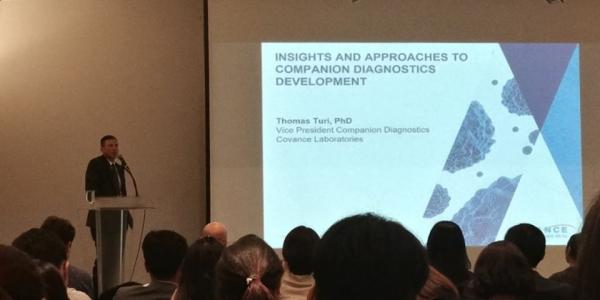"Opdivo had gone ahead of Keytruda in America until last year, but Keytruda will sweep the U.S. market this year."
So said Professor Bang Young-joo방영주 of Seoul National University Hospital서울대병원(Department of Hemato-oncology) while explaining the importance of biomarker to identify appropriate targets in developing new drugs and comparing the two immunity anticancer therapy -- Opdivo (compound: nivolumab) and Keytruda (compound: pembrolizumab).
"The possibility of getting positive results in clinical trials is high among patients with the high occurrence rate of PD-LI, but the number of the potential patients get smaller in actual marketing,” Professor Bang said at a seminar co-hosted by Korea Biomedicine Industry Association(KOBIA)한국바이오의약품협회 and Covance in a Palace Hotel in Seoul Monday. “On the other hand, the market can grow larger if we can get positive results by lowering the occurrence rate of PD-L1.”

"In the clinical trials conducted competitively by BMS and MSD, Keytruda got positive results by targeting patients with the high occurrence rate of PD-L1 of more than 50 percent compared to platinum-based two-drug therapy. However, Opdivo could not get any better results than platinum-based chemo therapy by targeting PD-L1 the occurrence rate of 5 percent or more,” Bang went on to say.
He said the results have affected their market share.
"BMS might have made the decision after giving it a lot of thought because it lagged behind Merc in biomarker research despite earlier study of immunity anticancer therapy than the latter,” he said. “Opdivo had been ahead of Keytruda in the U.S. lung cancer market until last year, but Keytruda will dominate it from this year. This is a good case of showing how important biomarker is in the development of new drugs."
He predicted the demand would also increase for more precious biomarker in the future. It will be necessary to select some patients who respond positively to the immunity anticancer therapy affects from the aspects of medical science as well as controlling medical costs.
"Assuming 80 percent of patients fail to get results with the immunity anticancer therapy, the next issue to consider will be how to make them benefit from these drugs," Bang said.
Because of that, some participants called for making the most of companion diagnosis from the stage of starting to develop new drugs. The importance of biomarker applies not only to anticancer treatments but to other therapies as well, they said.
"The ratio of patients who can be completely cured is not high, either, even in other diseases than cancer,” said Thomas Turi, vice president in charge of the companion diagnosis division at Covance. “To heighten the possibility of developing new drugs by targeting patients more accurately, it is necessary to provide precision medicine based on accurate biomarkers."
"There are many difficulties developing new drugs, requiring the improvement of processes,” he went on to say. “The introduction of the companion diagnosis will lead to more efficient development of new drugs.”

